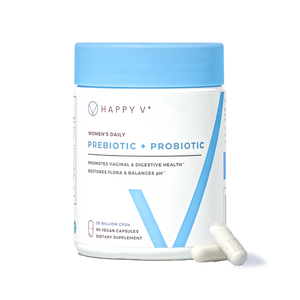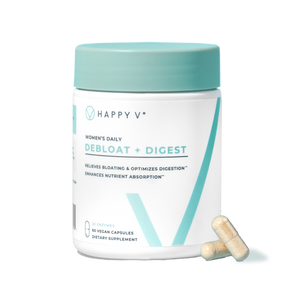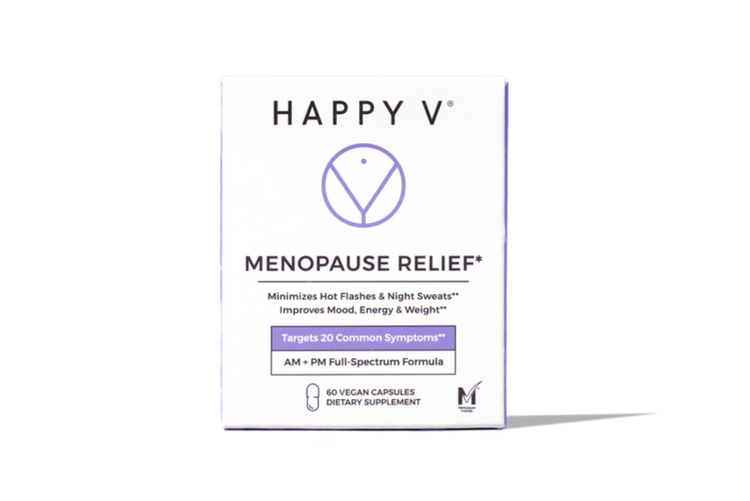- Fact Checked
- September 11, 2025
- 20 min read
What Age Does Menopause Start? Your Complete Guide to Timing, Symptoms & What to Expect
Table of Contents
Table of Contents
Menopause often gets framed as something to dread, like it’s the end of vitality or the start of decline. But the truth is, it’s simply another natural milestone in your health journey, just like your first period. Only this time, you’re entering it with decades of wisdom, perspective, and experience on your side.
The tricky part is that menopause doesn’t look the same for everyone. For some, it sneaks in quietly; for others, it storms in with hot flashes and sleepless nights. Naturally, that raises a lot of questions: When will it start? What are the first signs? What if it comes early? And how will it shape my health in the years ahead?
That’s exactly what this guide is here to answer, clearly, compassionately, and with the science you need to feel informed and empowered.
This post is for informational purposes only and does not constitute medical advice. See full disclaimer below.
What Is Menopause?
Let's start with the basics. Menopause is the natural biological process that marks the permanent end of your menstrual cycles and reproductive years. It's officially diagnosed when you've gone 12 consecutive months without a period1.
But here's what's important to understand: menopause isn't just one moment in time. It's actually the final stage of a gradual transition that can span years, or even a decade, during which your ovaries slowly decrease their production of the hormones estrogen and progesterone.
What's the Average Age for Menopause?
Most women reach menopause around age 51, but the normal range for women spans anywhere from 45 to 55. Menopause is officially diagnosed when you've gone 12 consecutive months without a period, marking the natural end of your reproductive years.
But here's where it gets interesting (and a little complicated): the transition to menopause actually starts years before you reach that 12-month mark2. This stage is called perimenopause, and it typically kicks in during your early-to-mid 40s, though it can start as early as your late 30s.
Understanding Perimenopause: The Transition Years
Think of perimenopause as menopause's opening act, one that could last anywhere from 4-10 years. During this time, your ovaries gradually dial down their production of estrogen and progesterone, which leads to some noticeable changes in your menstrual cycle and beyond.
You might start noticing:
- Skipped periods or cycles that are shorter or longer than usual3
- New or intensified PMS-like symptoms, like bloating and mood swings
- Hot flashes or night sweats4
- Changes in your energy levels or trouble sleeping5
What Influences When Menopause Starts?
Often, when women ask when menopause starts, they are actually asking when perimenopause—or the gradual decline of ovarian function and symptoms that accompany it—starts.
Several factors can influence your personal menopause timeline:
-
Genetics: If your mom, sister, or grandmother experienced early menopause, there's a good chance you might follow a similar pattern. Family history is one of the strongest predictors of timing.
-
Lifestyle factors: Smoking is a big one. It can cause menopause to arrive up to 2 years earlier than it would otherwise. Chronic stress and poor nutrition can also accelerate the menopause process.
- Medical history: Certain surgeries, medications, or chronic health conditions can bring on menopause sooner than expected.
Early and Premature Menopause: Causes and Risk Factors
Most women do not experience menopause until their early 50s, and have menstrual cycles (although irregularly) throughout their 40s.
For 5% of women, though, menopause occurs between the ages of 40 and 45. This is known as early menopause.
For 1% of women, menopause occurs before 40. This is known as premature menopause. In fact, the youngest ever reported case of menopause was age 14. While this is extremely, extremely rare, it goes to show just how varied the menopause experience can be.
What Causes Early Menopause?
There are several reasons a woman could experience menopause early, including:
-
Primary ovarian insufficiency: Essentially, the ovaries stop working properly before age 40, leading to lower hormone levels and irregular or missed periods.
-
Genetic disorders: Conditions like Turner syndrome or fragile X premutation can affect ovarian function.
-
Autoimmune disorders: Sometimes your immune system gets confused and starts attacking your ovarian tissue. Conditions like Graves' disease or rheumatoid arthritis can trigger this.
-
Cancer treatments: Chemotherapy and pelvic radiation can damage the ovaries, sometimes permanently.
-
Surgical menopause: If you need to have your ovaries removed (oophorectomy), you'll experience immediate menopause regardless of your age.
- Smoking: Like we mentioned earlier, smoking doesn't just affect your lungs. It can push menopause up by several years.
How Is Menopause Diagnosed?
Unlike a pregnancy test, there's no single test that definitively says "you're in menopause." In fact, menopause is unique because it is usually only diagnosed after it’s occurred in what’s called a retrospective diagnosis.
The Diagnostic Process
Your provider will take several factors into account when deciding if you are in menopause, including:
-
Your menstrual history: The gold standard is still that 12-month mark without periods. Your provider will want to discuss your menstrual cycle patterns over the past year.
-
Symptom evaluation: Hot flashes, night sweats, mood changes, and sleep disruption are all strong clinical indicators that help paint the bigger picture. Many women find it helpful to track their symptoms and their menstrual cycles. This not only helps you have better conversations with your doctor but can help you notice patterns or worsening symptoms that require attention.
-
Blood tests: Your provider may take blood to check hormone levels like FSH and estrogen, though typically, this only happens if:
- You're under 40 and experiencing symptoms (to check for premature menopause)
- Your symptoms are unusual or atypical
- There's a medical reason to rule out other conditions
- You're under 40 and experiencing symptoms (to check for premature menopause)
It may seem unusual that hormone tests aren’t part of a standard menopause diagnosis, but the truth is, during perimenopause, hormone levels fluctuate wildly and unpredictably, making blood tests unreliable for most women going through the normal transition. That’s why doctors only request them in certain cases.
Routine Monitoring and Preventive Screenings
Once your doctor determines you are in menopause, they will likely want to perform certain preventative screenings. These screenings are not “one-and-done” but should be repeated throughout your menopausal and postmenopausal years.
These screenings include:
-
Bone density testing (DEXA scans): Your provider may want to monitor bone strength over time, as menopause significantly increases osteoporosis risk6.
-
Mammograms: Breast cancer risk changes with age and hormonal status, making regular mammograms essential.
-
Pelvic exams and Pap smears: Routine gynecological care remains important for overall reproductive health.
- Cardiovascular screenings: With increased heart disease risk post-menopause, blood pressure and cholesterol monitoring becomes more frequent.
At-Home Menopause Tests
You might see at-home menopause test kits available, but here's the reality: they're not very reliable. These tests typically measure FSH levels, but because hormones fluctuate so much during perimenopause, a single test can't give you an accurate picture. Save your money and have a conversation with your gynecologist or other healthcare provider instead.
The Symptoms and Signs of Menopause
Though most people are told to dread the symptoms of menopause, they are actually an important way your body is communicating changes to you. The tricky part is, though, every body has its own “vocabulary.” Some experience symptoms that feel like a whisper, while others feel like their symptoms are shouting to be heard. Here's what you need to know about the full spectrum of symptoms and how they evolve.
Early Perimenopause: The Subtle Signals
During early perimenopause, symptoms often masquerade as other things. You might think you're just stressed, getting older, or dealing with a particularly rough patch of PMS. Common early signs include:
Menstrual changes:
- Cycles that are slightly shorter or longer than your usual pattern7
- Flow that's unexpectedly heavy or light
- PMS symptoms that feel more intense or different than usual
Physical symptoms:
- Occasional hot flashes (often dismissed as being "warm" or blaming the room temperature)
- Breast tenderness that doesn't align with your usual cycle
- Energy fluctuations throughout the day
- Sleep that's less restful, even when you get enough hours
Emotional and cognitive changes:
- Mood swings that feel disproportionate to the situation8
- Increased irritability, especially around your period
- Subtle memory lapses or difficulty concentrating
Late Perimenopause: When Symptoms Intensify
This is typically when most women realize something significant is happening. Symptoms become more frequent, intense, and harder to ignore:
Menstrual chaos:
- Periods that skip months then return with a vengeance9
- Cycles that vary wildly (21 days one month, 45 the next)
- Flooding or extremely heavy periods alternating with very light ones
- Spotting between periods
Vasomotor symptoms (the technical term for heat-related symptoms):
-
Hot flashes: Sudden waves of intense heat, usually starting in the chest and rising to the face and head10
-
Night sweats: Hot flashes that happen during sleep, often soaking your pajamas and sheets
- Cold flashes: Less common but equally disruptive sudden chills
Sleep disruption:
- Difficulty falling asleep
- Waking up multiple times per night (often due to night sweats)
- Early morning awakening with inability to fall back asleep
- Restless, unrefreshing sleep even when you get enough hours
Cognitive symptoms:
-
"Brain fog": Difficulty concentrating, word-finding problems, mental fatigue11
-
Memory lapses: Forgetting names, appointments, or why you walked into a room
- Reduced mental clarity: Feeling like you're thinking through molasses
Physical changes:
- Joint aches and stiffness, especially in the morning
- Muscle soreness without increased activity
- Headaches that are more frequent or severe
- Dry eyes, dry mouth, or general feeling of "drying out"
- Hair thinning or changes in texture
Emotional and psychological symptoms:
- Mood swings that feel intense and unpredictable
- Increased anxiety, sometimes including panic attacks
- Irritability or anger that feels disproportionate
- Feelings of sadness or depression
- Reduced patience and emotional resilience
Menopause and Early Post-Menopause: Peak Symptom Territory
Paradoxically, some women feel slightly better once they reach official menopause because while hormone levels are low, they're more stable. However, this is also when certain symptoms may peak, especially:
Persistent vasomotor symptoms:
- Hot flashes that may be at their most frequent and intense
- Night sweats that significantly disrupt sleep
- Some women experience 10-20 hot flashes per day
Urogenital symptoms:
-
Vaginal dryness: Decreased lubrication and elasticity
-
Painful intercourse: Due to vaginal tissue changes
-
Urinary urgency: Feeling like you need to urinate more frequently
- Recurrent UTIs: Due to changes in the urinary tract lining
Skin and hair changes:
- Skin becomes thinner, drier, less elastic
- Hair thinning or loss, particularly at the crown
- Changes in hair texture (coarser, more gray)
- Brittle or splitting nails
Body composition changes:
- Weight gain, particularly around the midsection
- Loss of muscle mass
- Changes in body shape even without weight gain
Late Post-Menopause: The Long-term Landscape
For most women, the acute symptoms of menopause gradually subside in the years following menopause, but some changes become more permanent12.
Symptoms that typically improve during post-menopause include:
- Hot flashes and night sweats usually decrease significantly
- Sleep often improves as night sweats subside
- Mood typically stabilizes
- Energy levels often return to baseline
Symptoms that may persist or worsen during post-menopause are:
- Vaginal and urinary symptoms often continue without treatment
- Joint stiffness and aches may persist
- Skin dryness and thinning continues
- Bone density loss accelerates
The Symptom Severity Spectrum
Unfortunately, it’s hard to predict how severe your menopause symptoms will be until you are actually experiencing them. Statistically, though, here is how it breaks down:
15-20% of women experience mild symptoms like:
- Occasional hot flashes that are manageable
- Minor sleep disruption
- Mood changes that don't significantly impact daily life
Mild symptoms have minimal impact on work, relationships, or activities
About 60-65% of women report more moderate symptoms, like:
- Regular hot flashes that are noticeable but manageable
- Some sleep disruption but able to function normally
- Mood changes that require attention but don't dominate daily life
Moderate symptoms do have an occasional impact on daily activities
For 20-25% of women, the menopause symptoms are severe and can include:
- Frequent, intense hot flashes that significantly disrupt daily life13
- Severe sleep disruption affecting daytime functioning
- Mood changes that impact relationships and work performance
- Physical symptoms that interfere with normal activities
The good news is that, despite what the conversation around menopause has been thus far, you don’t have to struggle through symptoms. Effective treatment options are available, and we’ll get into what those look like later.
When Symptoms Become Concerning
While most menopause symptoms are natural, some warrant immediate medical attention:
Seek prompt care for:
- Severe depression or thoughts of self-harm
- Panic attacks that are new or worsening
- Bleeding that soaks through a pad or tampon every hour for several hours
- Any vaginal bleeding after you've gone 12 months without periods
- Severe joint pain that limits mobility
- Symptoms that significantly impair your ability to function at work or home
Menopause Relief AM + PM
Supports mood, energy and weight. Minimizes hot flashes and night sweats.
Symptom Relief That Really Works
Menopause symptoms can be unpredictable, with hot flashes one week, sleepless nights the next, mood swings sprinkled in for good measure. The good news is you don’t have to just “power through.” The right mix of lifestyle changes, medical care, and daily support can dramatically improve how you feel.
Nutrition That Supports Relief
When estrogen dips, your body processes food differently and certain dietary shifts can reduce symptoms right away. When it comes to nutrition, focus on:
- Heart-healthy eating: Prioritize fruits, vegetables, whole grains, and lean proteins to support cardiovascular health. This also helps reduce long-term risks14.
- Smart beverage choices: Cutting back on caffeine and alcohol can lessen the frequency and intensity of hot flashes.
- Mindful caloric intake: Because metabolism slows during midlife, smaller portions and nutrient-dense foods can help avoid unwanted weight gain.
Movement That Matters
Physical activity isn’t just about staying fit. It directly relieves menopause symptoms.
These exercises have all been shown to improve menopause symptoms:
- Cardio: At least 150 minutes of moderate exercise per week helps reduce hot flashes, boost mood, and support sleep.
- Strength training: Weight resistance protects bone density and preserves muscle mass, reducing aches and stiffness.
- Flexibility: Yoga or stretching calms stress and eases joint discomfort.
Sleep and Stress Support
Hormonal shifts can wreak havoc on sleep and emotions, but small tweaks make a big difference, especially:
- Better sleep hygiene: Keep the bedroom cool, limit screen time, and stick to consistent bedtimes to counter night sweats and insomnia.
- Stress management: Support groups, counseling, meditation, or mindfulness practices help ease mood swings and anxiety.
- Targeted supplements: Vitamin D and calcium protect bones, while certain botanicals and adaptogens may help balance mood and energy.
Medical Treatment Options
For women with moderate to severe symptoms, medical treatments offer proven relief. Talk to your healthcare provider about:
- Hormone therapy: Still the gold standard for treating hot flashes, night sweats, and vaginal dryness. Both estrogen-only and estrogen-progestogen therapies are available, depending on your health history.
- Nonhormonal medications: Options like SSRIs, gabapentin, or clonidine may help reduce hot flashes and stabilize mood.
- Topical treatments: Vaginal lubricants and moisturizers restore comfort and reduce dryness for sexual health.
Relief from menopause symptoms often comes from combining strategies—some natural, some medical, and often both. Here are the most effective options women turn to:
Natural Relief
For many women, the best approach to symptom relief is a mix of natural and medical options. Practices like acupuncture, yoga, and targeted supplements can be powerful tools that support lifestyle changes and other prescribed treatments.
Acupuncture
Acupuncture has been shown to reduce the frequency and severity of hot flashes and improve sleep quality. By promoting relaxation and rebalancing energy flow, it offers a non-drug option for women who want natural relief.
Yoga and Mind-Body Practices
Gentle movement practices like yoga, stretching, and meditation help ease joint pain, reduce stress, and improve mood swings. They can also support better sleep, making them a well-rounded tool for both physical and emotional symptoms.
Supplements
When it comes to menopause, not all supplements are created equal. The most effective ones use clinically studied ingredients that target specific symptoms, like:
- Black cohosh - shown to reduce hot flashes and night sweats
- Vitamin B12 - supports steady energy and focus15
- Ashwagandha - helps balance mood and reduce stress16
- Magnesium - promotes relaxation and muscle recovery17
- Valerian root - supports restful sleep
- Chamomile extract - eases night sweats and calms the body
Happy V’s Menopause Relief AM + PM brings these proven ingredients together in a unique dual formula. The AM blend targets energy, hot flashes, and mood, while the PM blend focuses on sleep, night sweats, and evening relaxation. The result? Around-the-clock symptom relief that helps you feel like yourself again.
Understanding the Health Implications and Long-Term Risks
Thriving in your menopausal and post-menopausal years is not just about managing symptoms (though that’s a big part of it!).
When estrogen levels decline, it creates cascading effects throughout your entire body. Before menopause, estrogen acts as a protective hormone throughout your body. It helps keep your bones strong, your blood vessels flexible, your brain sharp, and your tissues healthy. When estrogen production drops dramatically during menopause, you lose many of these protective effects, which explains why certain health risks increase significantly.
The areas of health that menopausal and post-menopausal women need to pay special attention to include:
Bone Health
As estrogen declines, the natural process of bone remodeling is disrupted18. Bone breakdown accelerates, while new bone forms more slowly. That’s why women lose up to 20% of bone density in the first 5–7 years after menopause, leaving the spine, hips, and wrists particularly vulnerable to fractures. By age 65, nearly one in three women has osteoporosis, often without realizing it.
What you can do: Prioritize calcium and vitamin D, add weight resistance exercise, avoid smoking, and ask your provider about bone density scans.
Cardiovascular Health
Before menopause, estrogen helps keep arteries flexible, cholesterol balanced, and inflammation in check19. Once those levels fall, LDL (“bad”) cholesterol often rises, blood vessels stiffen, and blood pressure climbs. These changes are why a woman’s risk of heart disease increases steadily after menopause and, by age 60, matches that of men. Heart disease then becomes the leading cause of death for postmenopausal women.
What you can do: Eat a heart-healthy diet, exercise regularly, manage stress, and keep up with cholesterol and blood pressure checks.
Urogenital Health
Estrogen also maintains healthy tissue in the urinary tract and vagina. Without it, those tissues thin and dry out, making infections more common, increasing incontinence, and often leading to discomfort or pain during sex. Unlike hot flashes, these symptoms rarely fade over time. In fact, they often get worse without treatment.
What you can do: Stay hydrated, use vaginal moisturizers or lubricants, practice pelvic floor exercises, and ask your provider about low-dose vaginal estrogen if symptoms persist.
Weight and Body Composition
Declining estrogen affects both metabolism and fat distribution. Around menopause, muscle mass naturally decreases while abdominal fat increases, even without weight gain overall20. This shift isn’t just cosmetic: belly fat is linked to higher risks of diabetes, heart disease, and metabolic syndrome. Combine that with a slowing metabolic rate, and weight management becomes more challenging.
What you can do: Focus on strength training, keep active daily, adjust caloric intake, and maintain balanced blood sugar with whole foods.
Cognitive Health
Many women notice “brain fog” during menopause, which is described as trouble concentrating, memory lapses, or word-finding difficulties. While frustrating, these changes are typically temporary. Research shows menopause itself doesn’t cause dementia; normal aging is the bigger factor. Still, declining estrogen may influence brain function, and hormone therapy may affect long-term cognitive risks in some women.
What you can do: Support brain health with consistent sleep, physical activity, stress management, and mentally stimulating activities. If symptoms feel overwhelming, talk to your provider.
Skin, Hair, and Oral Health
Estrogen plays a role in collagen production and tissue integrity. Within the first 5 years after menopause, collagen levels may fall by 30%, leading to thinner, drier skin and slower wound healing. Hair may become brittle or thin, while oral changes, like reduced saliva, gum disease, or jawbone loss, can affect long-term dental health.
What you can do: Use gentle skin care, sun protection, hydrate well, consider collagen-supportive nutrition, and stay on top of dental visits.
Additional Health Considerations
While menopause doesn’t have a universal impact on sleep, mood, and immune function the way it does on bone density and cardiovascular health, these ares of health should not go neglected.
Sleep Disorders
Menopause-related hormone changes, combined with hot flashes and night sweats, can worsen sleep apnea or other sleep problems. Poor sleep doesn’t just leave you tired; it increases risks of weight gain, cardiovascular disease, and mood issues over time.
What you can do: Keep a regular sleep routine, limit caffeine and alcohol, try relaxation strategies before bed, and ask your provider about sleep studies if you suspect sleep apnea.
Mental Health
Mood swings are common during the menopausal transition, but for some women, symptoms may progress to depression or anxiety. Hormone shifts, sleep disruption, and life stressors (like caregiving or career changes) can all play a role.
What you can do: Prioritize self-care, consider therapy or counseling, lean on support groups, and talk to your provider if mood changes feel persistent or overwhelming.
Immune Function
Some studies suggest estrogen may help regulate immune responses, and when levels decline, the immune system might become less resilient. This could explain why some women report more frequent illnesses during or after menopause, though research is still emerging.
What you can do: Protect your immune system with regular exercise, nutrient-rich foods, good sleep, and staying up to date on vaccinations and screenings.
The Importance of Monitoring and Prevention
Understanding menopause-related risks isn’t about fear, but empowerment. You can’t stop menopause, but you can control how it affects your health by staying proactive with regular checkups and preventive care. The most important include:
Bone Health Monitoring
Bone loss accelerates after menopause, but it’s often silent until a fracture occurs. Bone mineral density scans (DEXA scans) can spot problems early21. These are typically recommended at age 65, or earlier if you have risk factors like family history or previous fractures.
Ask your provider when you should start bone density testing and support bone health through diet, exercise, and supplements if recommended.
Cardiovascular Monitoring
Since heart disease becomes the leading cause of death for postmenopausal women, keeping track of your cardiovascular health is non-negotiable. Blood pressure, cholesterol, and blood sugar checks can reveal risks before they become problems.
Get regular screenings, track your numbers, and discuss heart disease risk assessments with your provider.
Cancer Screenings
Cancer risk rises with age, making screening more important in midlife and beyond. Mammograms remain essential since breast cancer risk increases after menopause. Cervical cancer screening and colorectal cancer screening are also vital parts of preventive care22.
Stay on schedule with mammograms, pap smears, and colonoscopies (or other colorectal screening methods) as recommended for your age and history.
Final Thoughts
Menopause represents a transition, not an ending. While the average age is 51, your personal timeline will be influenced by your genetics, lifestyle, and overall health. The most empowering thing you can do is stay informed and proactive: recognize the early signs, keep up with your health screenings, and work with your healthcare provider to create a care plan that's tailored to your unique needs.
Remember, menopause may change your hormones and cycles, but it doesn't have to diminish your quality of life. With the right knowledge, support, and tools, this stage of life can be one of strength, freedom, and newfound balance.
Keep the Conversation Going
-
Visit our blog for more women’s health tips.
-
Join our private Happy V Facebook group to hear from others who’ve been there.
- Explore supplements designed to support your vaginal health journey.
Disclaimer: This blog is for informational and educational purposes only and is not intended to diagnose, treat, cure, or prevent any disease. Statements about supplements have not been evaluated by the Food and Drug Administration. For more information about vaginal infections, visit the CDC or speak to a licensed healthcare provider.













